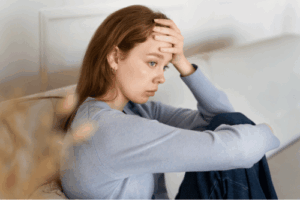Schizophrenia in Women: What You Need to Know
Schizophrenia is a mental disorder that affects how a person thinks, feels, and acts. While both men and women can get it, there are gender-related differences in how it shows up, especially for women. In this article, we will explore schizophrenia in women, including the signs, when it starts, how it affects daily life, and how to find help.
This guide is written in a simple, easy-to-understand way, following Google E-E-A-T rules to give you helpful and trustworthy information.

What Is Schizophrenia?
Schizophrenia is a serious mental illness that can cause a person to see or hear things that aren’t real. These are called psychotic symptoms. It also affects emotions, memory, and how people talk or act. Some people may show disorganized thinking or disorganized behavior.
There are different types of psychotic disorders, including:
- Schizophrenia
- Schizoaffective disorder
- Delusional disorder
- Schizophreniform disorder
These illnesses are part of the schizophrenia-spectrum disorder group.
What Are the Symptoms of Schizophrenia?
People with schizophrenia may have:
- Positive symptoms – hearing voices, seeing things, or having strange beliefs
- Negative symptoms – feeling less joy, less energy, or trouble speaking
- Cognitive symptoms – trouble with memory or thinking clearly
- Affective symptoms – feeling sad, anxious, or angry
The onset of symptoms usually begins between ages 20 and 30 in women, which is later than in men. This is known as the age of onset or age at onset.
Differences in Schizophrenia Between Women and Men
There are sex differences in how schizophrenia starts and affects people. Women tend to have:
- Later onset of schizophrenia
- Fewer negative symptoms
- Better social function
- More mood-related symptoms like sadness or anxiety
Women also experience hormonal fluctuations, which can affect the onset of schizophrenia and how severe the symptoms are. Postmenopausal women may notice changes in their symptoms due to lower female hormones.
How Schizophrenia Affects Daily Life
Women with schizophrenia may struggle with:
- School or work
- Relationships with family or friends
- Taking care of themselves or their children
- Being safe from sexual exploitation or domestic abuse
Mothers with schizophrenia may need extra support. Pregnant women with schizophrenia need special care to keep themselves and their babies healthy.
This illness can lower the quality of life, especially if left untreated.

Common Risk Factors for Schizophrenia in Women
Here are some common risk factors:
- Genetic predisposition (family history)
- Environmental factors (stress, trauma, substance abuse, or Alcohol Abuse)
- Autoimmune disorders
- Neurodevelopmental disorders
- Having anxiety disorders or affective disorders like bipolar disorder
- Low socioeconomic status
If a woman uses drugs or has a substance use disorder, it may cause a psychotic episode or make symptoms worse.
Getting the Right Diagnosis
A doctor will look for certain signs to make a diagnosis of schizophrenia, such as:
- Delusions (strong false beliefs)
- Hallucinations (seeing or hearing things that aren’t there)
- Disorganized thinking
- Catatonic behavior (not moving or reacting)
Doctors follow special criteria for schizophrenia. It may take time to get the right diagnosis, especially if other psychiatric disorders are involved.
Treatment of Schizophrenia in Women
There is no cure for schizophrenia, but there are many effective treatment options, including:
1. Antipsychotic Drugs
These help control symptoms but can have antipsychotic side effects like weight gain or tiredness. Some drug trials and clinical trials are studying new options.
2. Behavioral Therapy
Therapy helps women cope with symptoms and improve cognitive function and social function.
3. Psychosocial Treatment
This supports women with everyday skills, jobs, or relationships.
4. Hormone Replacement Therapy
Some postmenopausal women may benefit from this, especially when female hormones are low.
5. Care for Women
Special care programs for women with psychosis or homeless women can give better results.
For women in Southern California, Revival Mental Health offers care for schizophrenia in women, including interventions for women with unique needs.
Challenges in Treating Women with Schizophrenia
Some women do not get help right away. This delay is called untreated psychosis, which can make the illness worse. Others stop treatment because of adverse effects or side effects.
Women may also have heart disease or cardiovascular disease, which can get worse with some medications. Doctors must watch closely for these risks.
Living with Schizophrenia as a Woman
Individuals with schizophrenia can still live meaningful lives. With the right support, women can:
- Keep jobs
- Build relationships
- Take care of families
- Feel more in control
Support from family, friends, doctors, and counselors is key. Good mental health care improves outcomes and lowers the chance of exacerbation of schizophrenia symptoms.
Where to Get Help
If you or someone you love is showing signs of schizophrenia, don’t wait. Early help makes a big difference. Visit Revival Mental Health’s Schizophrenia Treatment in Orange County page to learn more about getting help that fits women’s needs.

FAQs: Schizophrenia in Women
1. What are the first signs of schizophrenia in women?
Women may start feeling very sad, confused, or have trouble thinking clearly. They may hear voices or see things that aren’t real.
2. At what age does schizophrenia start in women?
It often starts in a woman’s late 20s or early 30s, which is later than in men. Some women have late-onset schizophrenia after menopause.
3. Can women recover from schizophrenia?
While there is no full cure for schizophrenia, many people with schizophrenia manage their symptoms and live full lives with treatment.
4. What makes schizophrenia worse in women?
Stress, drug use, hormone changes, and not taking medicine can all make symptoms worse.
5. Is schizophrenia different in women than in men?
Yes, there are many differences in schizophrenia. Women usually have later onset, more mood symptoms, and better social skills.
Final Thoughts
Schizophrenia in women is a real and serious mental health disorder, but with early help, the right treatment, and good support, women can live happy, full lives.
If you’re worried about yourself or someone else, click here to learn more about schizophrenia treatment in Orange County.
Visit SAMHSA or contact us today for more information.





